- Clone
- SE5A5 (See other available formats)
- Regulatory Status
- RUO
- Other Names
- SIRPa, SIRPb, SIRPalpha/beta, BIT, SHPS1, MFR, P84, PTPNS1, CD172 antigen-like family member A, CD172 antigen-like family member B
- Isotype
- Mouse IgG1, κ
- Ave. Rating
- Submit a Review
- Product Citations
- publications
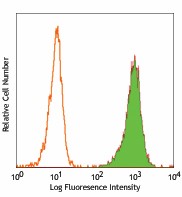
-

Human peripheral blood granulocytes stained with biotinylated SE5A5, followed by Sav-PE
| Cat # | Size | Price | Quantity Check Availability | Save | ||
|---|---|---|---|---|---|---|
| 323804 | 100 µg | 169€ | ||||
CD172a, also known as signal-regulatory protein α (SIRPα), src homology 2 domain-containing phosphatase substrate-1 (SHPS1), PTPNS1, BIT, MFR, and P84, is a 75-110 kD transmembrane glycoprotein involved in receptor tyrosine kinase coupled signaling pathway. It belongs to the Ig superfamily and is primarily expressed on monocytes/macrophages, granulocytes, dendritic cells, and neurons. CD172a serves as a substrate of activated receptor tyrosine kinases (RTKs). The interaction of CD172a intracellular domain with SHP-1 and SHP-2 displays negative signaling in the regulation of leukocyte adhesion and transmigration, T cell activation, macrophage fusion, and phagocytosis. CD47 (IAP) is the extracellular ligand for CD172a. SIRPα was recently demonstrated to be a specifc marker for cardiomyocytes derived from human pluripotent stem cells2.
Product DetailsProduct Details
- Verified Reactivity
- Human
- Reported Reactivity
- African Green, Baboon, Cynomolgus, Rhesus
- Antibody Type
- Monoclonal
- Host Species
- Mouse
- Immunogen
- NIH-3T3/hu-SIRPα cell line
- Formulation
- Phosphate-buffered solution, pH 7.2, containing 0.09% sodium azide.
- Preparation
- The antibody was purified by affinity chromatography, and conjugated with biotin under optimal conditions.
- Concentration
- 0.5 mg/ml
- Storage & Handling
- The antibody solution should be stored undiluted between 2°C and 8°C. Do not freeze.
- Application
-
FC - Quality tested
- Recommended Usage
-
Each lot of this antibody is quality control tested by immunofluorescent staining with flow cytometric analysis. For flow cytometric staining, the suggested use of this reagent is ≤0.125 µg per million cells in 100 µl volume. It is recommended that the reagent be titrated for optimal performance for each application.
- Application Notes
-
Clone SE5A5 recognizes a common epitope on SIRPa (90 kD) and SIRPß (50 kD)3. A high degree of homology has been found between SIRP family isoforms alpha and beta at the level of extracellular domains. Consequently, many anti SIRP antibody clones, such as SE5A5, have been reported to cross react with several SIRP isoforms1,4,5. It reacts with CD172a and has weak cross-reaction with CD172b. This antibody is able to block the binding of SIRPa (SIRPa1 and SIRPa2) to CD471,6.
- Application References
-
- Seiffert M, et al. 1999. Blood 94:3633.
- Dubois NC, et al. 2011. Nat. Biotechnol. 29:1011.
- Barros MM, et al. 2009. Transfusion 49:154.
- Liu Y, et al. 2005. J. Biol. Chem. 280:36132.
- Barclay AN. 2009. Curr. Opin. Immunol. 21:47.
- Florian S, et al. 2005. J. Leukoc. Biol. 77:984.
- Product Citations
-
- RRID
-
AB_830703 (BioLegend Cat. No. 323804)
Antigen Details
- Structure
- 75-110 kD glycoprotein , signal-regulatorey-protein family, Ig superfamily
- Distribution
-
Monocytes/macrophages, granulocytes, dendritic cells, neurons, cardiomyocytes
- Function
- Negative regulation of leukocyte adhesion and transmigration, macrophage fusion, phagocytosis
- Ligand/Receptor
- CD47
- Cell Type
- Dendritic cells, Granulocytes, Macrophages, Monocytes, Neurons
- Biology Area
- Immunology
- Molecular Family
- CD Molecules
- Antigen References
-
1. Seiffert M, et al. 1999. Blood 94:3633.
2. Seiffert M, et al. 2001. Blood 97:2741.
3. Timms JF, et al. 1998. Mol. Cell Biol. 18:3838.
4. Barclay AN and Brown MH. 2006. Nat. Rev. Immnuol. 6:457. - Gene ID
- 140885 View all products for this Gene ID
- UniProt
- View information about CD172a/b on UniProt.org
Related Pages & Pathways
Pages
Related FAQs
- How many biotin molecules are per antibody structure?
- We don't routinely measure the number of biotins with our antibody products but the number of biotin molecules range from 3-6 molecules per antibody.
Other Formats
View All CD172a/b (SIRPα/β) Reagents Request Custom Conjugation| Description | Clone | Applications |
|---|---|---|
| Purified anti-human CD172a/b (SIRPα/β) | SE5A5 | FC |
| Biotin anti-human CD172a/b (SIRPα/β) | SE5A5 | FC |
| PE anti-human CD172a/b (SIRPα/β) | SE5A5 | FC |
| PE/Cyanine7 anti-human CD172a/b (SIRPα/β) | SE5A5 | FC |
| APC anti-human CD172a/b (SIRPα/β) | SE5A5 | FC |
| PerCP/Cyanine5.5 anti-human CD172a/b (SIRPα/β) | SE5A5 | FC |
| PE/Cyanine5 anti-human CD172a/b (SIRPα/β) | SE5A5 | FC |
| Alexa Fluor® 700 anti-human CD172a/b (SIRPα/β) | SE5A5 | FC |
| APC/Fire™ 750 anti-human CD172a/b (SIRPα/β) | SE5A5 | FC |
| FITC anti-human CD172a/b (SIRPα/β) | SE5A5 | FC |
| APC/Cyanine7 anti-human CD172a/b (SIRPα/β) Antibody | SE5A5 | FC |
| Spark Red™ 718 anti-human CD172a/b (SIRPα/β) (Flexi-Fluor™) | SE5A5 | FC |
Compare Data Across All Formats
This data display is provided for general comparisons between formats.
Your actual data may vary due to variations in samples, target cells, instruments and their settings, staining conditions, and other factors.
If you need assistance with selecting the best format contact our expert technical support team.
-
Purified anti-human CD172a/b (SIRPα/β)
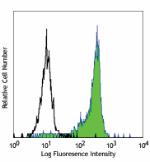
Human peripheral blood monocytes stained with purified SE5A5... -
Biotin anti-human CD172a/b (SIRPα/β)
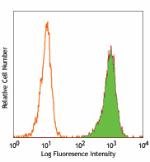
Human peripheral blood granulocytes stained with biotinylate... -
PE anti-human CD172a/b (SIRPα/β)
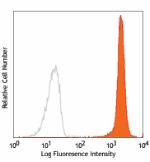
Human peripheral blood granulocytes stained with SE5A5 PE -
PE/Cyanine7 anti-human CD172a/b (SIRPα/β)
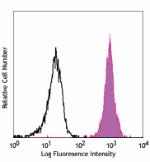
Human peripheral blood granulocytes stained with SE5A5 PE/Cy... -
APC anti-human CD172a/b (SIRPα/β)
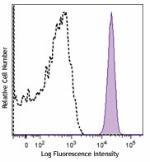
Human peripheral blood granulocytes were stained with anti-h... -
PerCP/Cyanine5.5 anti-human CD172a/b (SIRPα/β)
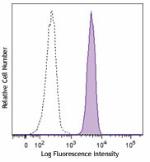
Human peripheral blood granulocytes were stained with anti-h... -
PE/Cyanine5 anti-human CD172a/b (SIRPα/β)
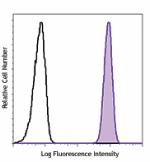
Human peripheral blood granulocytes were stained with CD172a... -
Alexa Fluor® 700 anti-human CD172a/b (SIRPα/β)
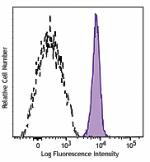
Human peripheral blood granulocytes were stained with anti-h... -
APC/Fire™ 750 anti-human CD172a/b (SIRPα/β)
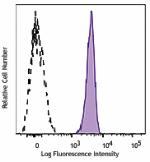
Human peripheral blood granulocytes were stained with anti-h... -
FITC anti-human CD172a/b (SIRPα/β)
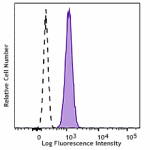
Human peripheral blood granulocytes were stained with anti-h... -
APC/Cyanine7 anti-human CD172a/b (SIRPα/β) Antibody
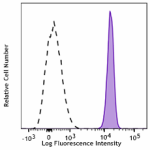
Human peripheral blood granulocytes were stained with CD172a... -
Spark Red™ 718 anti-human CD172a/b (SIRPα/β) (Flexi-Fluor™)
 Login / Register
Login / Register 










Follow Us